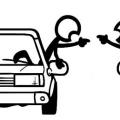Do you want to teach your child to clean the house, but preferably without household chemicals?
Look for safe household cleaners.
We have selected 10 life hacks that will help you clean your house without chemicals.

Tile in the bathroom is one of the problem areas. To clean an apartment without chemicals, you will need 1/4 cup of hydrogen peroxide, 1 teaspoon liquid soap and 1/2 cup soda. Mix the ingredients, apply them on a sponge and wipe the problem areas. In very advanced cases, apply the composition to the contaminated area and leave for 10 minutes. After such cleaning without chemicals, rinse the composition with water.

To clean a gas stove without chemicals, you will need cotton swabs, an unnecessary toothbrush and ammonia-anise drops. Soak a cotton swab in drops and wipe the contaminated places on the gas stove. A toothbrush will cope with very neglected places. And don't forget to wear gloves!

The kitchen is a collection of polluted places. Apart from gas stove, cleaning without chemicals is also possible for kitchen hood. Boil water and slowly add 1/2 cup baking soda to it. Then lower the hood filters into boiling water, hold for a few minutes and remove the pan from the stove. If, after such cleaning without chemicals, fat and dirt still remain on the filters, repeat the procedure or try to do the same with 1/2 cup of ammonia in 3.5 liters of water.

If you prefer cleaning your home without chemicals, ammonia can help you clean up your oven as well. You just need to add it to the container and put it in a cold oven overnight. In the morning, pollution can be easily removed with a regular sponge. But don't forget to wear rubber gloves and ventilate the kitchen.

To clean the kettle without chemicals, you will need vinegar. Pour vinegar with water (ratio 1:2) into the kettle, close the spout of the kettle and boil until the scale is gone. After such cleaning without chemicals, thoroughly wash the kettle.

Washing dishes without chemicals is also possible. This requires soda and dry mustard. Mix these ingredients in a ratio of 1:3 - a chemical-free cleaner is ready.

Washing the refrigerator without chemicals will help soda. Dissolve 2 tbsp. l. soda in 1 liter of water. Wash all contaminated places in the refrigerator with this product.

Pure, undiluted vinegar will clean and sanitize the toilet.

Liquid soap, 3% peroxide, and baking soda will clean up a soiled mattress. Mix 3 tbsp. l. baking soda and 235 ml of hydrogen peroxide and add this mixture to a spray bottle. Wait for the baking soda to dissolve and add some liquid soap. Shake the bottle of the mixture well to mix it up and spritz on the stains. Leave for 5-10 minutes, remove the remaining soda with a vacuum cleaner.

Soda and alcohol can clean a microfiber sofa without chemicals. Apply some isopropyl alcohol to a sponge and wipe the stained areas. After cleaning, clean up the fibers of the sofa with a brush. And soda will help get rid of the smell of alcohol.
Almost all chemical detergents are harmful to health and pollute the air in our apartment.
Even if it is impossible today to completely abandon household chemicals, it is still worth reducing its use to a minimum, returning to the good old-fashioned cleaning methods.
We've put together some cleaning tips simple means that will help keep the house in perfect cleanliness.
Anti rust in the bathroom

Rust in tiles can be removed by wiping the stained area with a sizzling mixture of vinegar and baking soda. Leave the product on for a couple of minutes, then rinse with water and pat dry. Get rid of dirt and stains

The best window cleaner is water with the addition of ordinary ammonia (1 part of ammonia is diluted in 10 parts of water). After washing, the windows are wiped dry with newsprint or a rag. Also, the function of a cleaning agent is excellently performed by raw potatoes. To do this, wipe the windows with potato halves and wipe with a dry cloth. To make the floor shine

To achieve the perfect shine of the parquet, use the following solution: dilute 1/4 cup of vinegar in 1 liter of water. Wash the tiles with boiling water.
From scale in the washing machine

To dissolve the scale, put the wash without laundry for one cycle at 80 ° C, after pouring 80 g into the laundry tray citric acid.To shine mirrors

Mirrors must be degreased before washing. To do this, add 2 tbsp to the solution with which we washed the windows. l. alcohol. How to clean a cutting board

For cleaning wooden board from the smell and stains, wipe it with half a lemon, sprinkle with salt and leave for 10-15 minutes. Then, with the rest of the lemon, again wipe the surface sprinkled with salt. Rinse with water.
Remove deep-seated dirt

To remove dirt, sprinkle carpets with starch and baking soda, then vacuum. This will help remove deep-seated dirt, and besides, baking soda will eliminate unpleasant odors. To get rid of bad odor

If there is an unpleasant smell in the refrigerator, wash it with water with lemon juice in equal proportions, you can add a small amount of soda to better wash off the dirt. Shower tiles and doors

You can get rid of streaks of limescale and fungus on the tile with soda or lemon. Dip a wet toothbrush in baking soda, scrub the tile seams, then rinse with water. Once a week, you can rub these surfaces with half a lemon, leave for 10-15 minutes, then rinse with water and wipe dry. To keep your oven looking like new

Mix 1 cup baking soda with 1/2 cup warm water. Apply the resulting paste on the oven doors and leave for 15 minutes. Rinse thoroughly and wipe the glass with a clean, dry cloth. Fill a spray bottle with white distilled vinegar, spray evenly and leave for 15 minutes. Then wipe dry with a cloth. Simple, but time-tested and proven folk remedies, they help out both at home and in the country. It is noteworthy that any housewife can find baking soda, salt, vinegar, citric acid, hydrogen peroxide, ammonia and ethyl alcohol, and, unlike purchased household chemicals, homemade “cleansers” are hypoallergenic, environmentally friendly and cost mere pennies.
Cleaning without chemicals does not require much time and special skill. The main thing is to use household gloves and do not forget to remove any funds after use in places inaccessible to small and fluffy household members.
Baking soda
- To get rid of the musty smell in the lockers, place homemade sachets (fabric bags) with soda on the shelves.
- Soda, diluted with water to the consistency of sour cream, will remove the unpleasant odor - the result of the vital activity of pets.
- Soda solution will refresh the refrigerator (4 tablespoons of soda per 1 liter of warm water). Wipe with a sponge soaked in the solution, the shelves and the inner walls of the unit.
- Soak sponges that have absorbed kitchen odors in a soda solution similar to the previous recipe, then rinse in warm water.
- Fill a pot or pan with the remnants of burnt food with water, add a couple of tbsp. tablespoons of soda and boil - it will be much easier to clean the dishes.
- Sprinkle greasy stains on the stove, baking sheet, pan or table with soda, and after 20-30 minutes remove the remaining dirt with a damp sponge.
- To remove carbon deposits in the oven, treat the contaminated areas with a paste (100 g of soda, 2 tablespoons of liquid soap / gel, a little water). Leave overnight.
- A product prepared from 100 g of soda and a bucket of warm water will help get rid of dirt on tile or other ceramic tiles, and restore a fresh look to the carpet. Spray the solution with a spray bottle onto the surface and leave for 15 minutes. After "walk" with a damp sponge (brush).
- Baking soda is great for cleaning plumbing. For a pleasant fragrance, add a few drops of any essential oil.
- Treat stainless steel surfaces (handles, faucets, faucets) with a slice of lemon sprinkled with soda. Let the composition dry, rinse with water, wipe dry.
Salt
Being, like soda, an absorbent, salt instantly absorbs unpleasant odors. Therefore, use it in bags or just a container filled with crystals to get rid of "aromas".
- Containers with airtight lids, where extraneous odors especially “stagnate”, sprinkle with salt (a couple of tablespoons is enough) for 15-20 minutes before washing.
- Salt absorbs fat well, and the abrasive properties help get rid of burnt food. Use salt to soak and wash pots, pans, and pans.
- The combination of salt and vegetable oil (usually sunflower oil) copes with the whitish circles that glasses and cups leave on wooden surface. Apply oil on the trail first, and then sprinkle with salt. Wash off with warm water after an hour.
- A wooden floor will have a pleasant shine if you add ½ cup of salt to a bucket of warm water when washing.
- In order for the broom or mop to last longer, soak it for 10-20 minutes in hot salted water before the first use.
- Mix salt with lemon juice (to the state of gruel), treat rusty smudges on pipes, taps, mixers with the resulting mixture. Leave for a few minutes and then wipe with a damp sponge.
Lemon juice and citric acid
Lemon perfectly neutralizes odors and removes lime.
- Wipe the cutting board, countertop (not suitable for porous stone surfaces), refrigerator shelves with a slice of citrus and see for yourself!
- Limescale does not like sour juice very much: treat the damaged surfaces with a slice of lemon, and to enhance the cleaning effect, polish the “stainless steel” with parchment (waxed) paper.
- To get rid of dried splashes and stains inside the microwave, bring a small amount of water to a boil inside the “stove” (put a slice of lemon in the container beforehand).
- The scale in the kettle will disappear without a trace: just fill it with water to the maximum mark, add 25 g of citric acid, and boil.
- Drum washing machine will be like new. Choose the "hottest" temperature regime and leave the machine to run idle (without linen), having previously poured citric acid into the drum. With a machine volume designed for 3-4 kg of washing, a pair of 25 g bags will suffice.
table vinegar
- Vinegar, diluted in half with cool or warm water, cleans almost any surface well: glass, plastic, linoleum, wood, stainless steel, ceramic tiles. In addition, it gives a pleasant sheen to smooth surfaces.
- To clean sticky cutlery, wipe it with a vinegar-soaked dry cloth.
- To get rid of unpleasant odors, treat the corners in the bathroom and kitchen, plumbing with a mixture of vinegar and water (in a ratio of 1: 1), poured into a spray bottle.
- Soak dishes with dried food residues in a warm solution (take 3 tablespoons of vinegar and 1 tablespoon of table salt in a bowl of water). Leave for an hour, then wash the dishes as usual.
- The following recipe will help from blockages in the pipes: pour soda (3/4 cup) into the drain, pour vinegar (1/2 cup). Wait half an hour, then drain hot water for several minutes.
Hydrogen peroxide
- To disinfect bathroom, kitchen surfaces, use a mixture of 3% hydrogen peroxide and mineral water(in a ratio of 1:1).
- Paired with baking soda, peroxide can rid dishes of burnt food: mix the products so that you get a thick paste, apply to the contaminated area. After a few minutes, rinse with plenty of water.
- Rust stains will disappear without a trace under the influence of hydrogen peroxide mixed with ammonia (in equal proportions).
- In the bathroom, this tool is indispensable: periodically process the tiles, and especially the seams between the tiles, aqueous solution hydrogen peroxide (in a ratio of 1: 1) and soon you will forget about what mold and fungus are.
Ammonia
- Already washed glasses with a soft sponge soaked in warm water (1 liter) with the addition of ammonia (1 tablespoon). This solution gives the glass a shine and removes unsightly stains. To fix the effect, polish the glass surface with a soft cloth.
- To clean the floor, dilute 5 ml of ammonia in 5 liters of water. Such a composition will not only make the surface shine, but also relieve stubborn unpleasant odors.
- Carpet stains are easy to remove if cooked. home remedy from ½ liter of water, 1 tbsp. spoons of liquid soap and 1 tbsp. spoons of ammonia. Hold the composition on the carpet for several minutes, and then remove it along with the contamination with a damp sponge.
- Homemade wood polish will come out no worse than store-bought: mix 200 ml of water, 5 drops of ammonia and 500 ml of glycerin.
Ethyl alcohol or vodka
- To make mirrors and glass surfaces shine, degrease them before washing: add a couple of tablespoons of alcohol to the soap solution.
- Use vodka or alcohol diluted to 40 degrees to treat the seams between the tiles in the bathroom, kitchen or toilet. This technique allows you to well disinfect the connections, preventing the subsequent reproduction of mold.
- With glue residue that usually ruins appearance items equipped with stickers, even the cheapest vodka or diluted alcohol can easily cope.
- With the help of vodka, prepare very greasy plates and cups for washing: add a little alcohol to a bowl of hot water, soak the dishes for 15-20 minutes.
Every woman worries about the health of her family. But often forgets about the harmful effects of household chemicals, which are used daily to clean the house. Dishwashing liquids, washing powders, all kinds of cleaning products for the bath, toilet bowl, kitchen appliances, glass and floor - contain harmful substances that adversely affect health. Problems can be avoided if replaced with affordable and proven means. We clean without household chemicals
For cleaning without chemicals, we need:
- soda;
- table vinegar;
- laundry soap;
- olive oil or glycerin;
- mustard;
- salt;
- toothpaste;
- lemon;
- turpentine or kerosene;
- hydrogen peroxide;
- microfiber cloths;
- newspapers;
- sponges;
- Steam Mop;
- enthusiasm and good mood.
So, let's open the window and get started, cleaning without chemicals awaits us.
Cleaning up the rooms
It is recommended to start cleaning the house, both daily and general, from the rooms, where, first of all, they sort out the rubble and put things in their places.
Painted doors, radiators and window sills are washed with a weak solution laundry soap.
 Snow-white window sill after washing
Snow-white window sill after washing To cope with household dust in the house, you can use a woolen rag. Electrifying, wool like a magnet will attract dust particles to itself.
Furniture. Use a soft microfiber cloth to remove dust from furniture.
Stains from your favorite coffee table or dining table easily eliminated with a natural remedy, a mixture of salt and vegetable oil. The finished mixture is applied to the stain, kept for 2 hours and wiped with a dry cloth.
 Clean coffee table all dirt removed
Clean coffee table all dirt removed Soiled polished surfaces are cleaned with a swab, which is moistened with warm vinegar. After the procedure, the furniture is wiped dry, now it is the personification of your home.
Are there marks from wet dishes on the furniture? Rub the stain with crushed walnut. Once the nut oil is absorbed, polish with a dry cloth.
It is enough to wipe a white spot from a hot mug with a swab dipped in vegetable oil. A tampon is made like this: a couple of tablespoons of salt are poured into a small fabric bag.
Carpets can be easily cleaned with fine table salt: sprinkle it on the surface of the carpet in an even layer and sweep it with a damp broom. The procedure is repeated until the salt is clean. At the end of cleaning, the remaining salt is removed with a vacuum cleaner.
 High pile carpet is harder to clean
High pile carpet is harder to clean Wash windows, glass cabinets and mirrors well with water with the addition of ammonia (4 tablespoons per 1 liter of water). next:
- If the windows in the house are dirty (after winter), then they must first be washed with a soapy solution prepared from ordinary laundry soap.
- Rinse glass clean water.
- Pour a solution of water and ammonia into a container with a spray bottle, apply on glass.
- Quickly wipe dry with a newspaper.
If the windows are not very dirty, then we immediately use ammonia.
Metal door and cabinet handles will shine when brushed with toothpaste. Apply it to the fittings, wait for it to dry, and then polish the metal to a shine with a dry soft cloth.
We clean the kitchen
I wash dishes at home. dry mustard will do, more natural remedies you can't imagine. Sprinkle the powder on the dishes and three with a damp sponge. Mustard is absolutely safe for people and pets, it cleans and disinfects, it is perfectly washed off with water.
It is easy to get rid of dirty dark deposits on plates, pots, pans, cups and spoons with baking soda. The agent must be applied to the dirt and wiped with the hard side of the sponge. This method is not suitable for cleaning non-stick interior surfaces.
To eliminate the odor from the pan, just wipe it with a weak solution of vinegar. You don't have to rinse the pan; the vinegar will dry out and eliminate the smell.
Plate. Grease stains and burnt food residues can be easily removed with lemon juice. To do this, cut the lemon in half, squeeze the juice from one half onto the stove, and distribute it over the surface with the other. After keeping the product for 20 minutes, rinse with water.
 Few people like to wash the stove, but it must be done regularly.
Few people like to wash the stove, but it must be done regularly. Table vinegar will help too. Dilute it with water and apply to hob. Across
Oven. Old fat is cleaned using the following tool: we take a quarter of a piece of laundry soap and dissolve it in half a glass of warm water. Add 2 tablespoons of salt and half a glass of table vinegar. Mix everything thoroughly and leave for an hour. The prepared solution is thickly applied to the walls of the oven, kept for 60 minutes, and then treated with a hard sponge or brush.
For prevention, rinse the oven immediately after use with a solution of vinegar. Then a major cleaning of the oven will be required infrequently.
 Overhaul of the oven
Overhaul of the oven The microwave is also one of the hardest to clean places in the kitchen. You can remove dirt and burnt fat by boiling one of the solutions in it for 10-15 minutes:
- water and 3 tablespoons of vinegar;
- water and 2 tablespoons of soda;
- water and 4-5 lemon slices or a bag of citric acid.
Water should be poured so much that it does not have time to boil away. When the microwave is turned off, the inside of the appliance can be cleaned effortlessly with a sponge or cloth.
Scale from the kettle is removed with vinegar. We dilute it with water, pour it into a kettle and boil for 10-15 minutes. Scum like never before.
 Descaling the kettle must be done regularly
Descaling the kettle must be done regularly Vinegar is disinfected cutting boards, which are home to a million microbes, and kitchen countertops.
Remember, cleaning the kitchen should not be done while cooking.
Cleaning the bathroom and toilet
Tile. The same solution of table vinegar will help to rid the tile of limescale, dirt and restore shine. We spray the product on the tile and, after waiting 10-15 minutes, wipe it with a damp cloth or napkin.
Toilet, sink, bathtub. To clean the plumbing of your entire home, baking soda and vinegar will help, two of the best tools for these needs. Sprinkle the surface of the toilet and sink with baking soda, then spray the vinegar solution and let it sit for 10-20 minutes. Then you need to brush the surfaces with a brush and rinse with water.
By the way, baking soda is a mild abrasive. It is harmless even for enameled bathtubs. Apply it on the surface and leave it to act for 20 minutes. The result will pleasantly surprise you.
 Baking soda is used in everyday life
Baking soda is used in everyday life A mixture made from a part of dry mustard, a part of citric acid and half a part of cornstarch works wonders with tiles. This tool is convenient to store in a jar with holes in the lid.
Faucets. You can restore the lost shine and remove limescale from the tap by wiping it with a cloth soaked in vinegar.
Washing machine. Remove scale from heating element you can, if you start the wash cycle by pouring a couple of sachets of citric acid into the drum. It is best to select the "Boiling" mode.
Bath curtain covered with dark spots? Sprinkle them with soda, rub them with a hard sponge or brush and the problem will be solved.
Sewerage. If your sewer is clogged and the water does not drain, pour a liter of boiling water into the drain hole. Hot water will dissolve dirt and grease, and the blockage will be eliminated.
 A good hostess always has a plunger at hand
A good hostess always has a plunger at hand In the event that this does not help, use a more aggressive method. Pour a glass of soda, then half a glass of salt, and add a glass of vinegar on top. Thanks to chemical reaction soda and salt will penetrate deeper into the blockage, dissolving dirt particles and making it looser. 20 minutes after you have poured all the funds, pour in a liter of boiling water and clean with a plunger.
A few words should be said about steam cleaners. These devices are directly designed for cleaning without chemicals. Their principle of operation is as follows: ordinary water is poured into the device, which quickly heats up to the boiling point. The resulting steam is forcefully supplied through the nozzle to the surfaces to be cleaned, ensuring perfect cleaning of glasses, carpets, mirrors, floors, ceramic tiles. In addition, the mop disinfects the surface and makes the house safe.
 Strive for perfect cleanliness in the kitchen
Strive for perfect cleanliness in the kitchen Here are just some of the ways you can clean your house without using any household chemicals. Using at least some of the tips from this article, you will not only achieve cleanliness of the outside, but also improve the microclimate of your home. Cleaning without chemicals is real.




